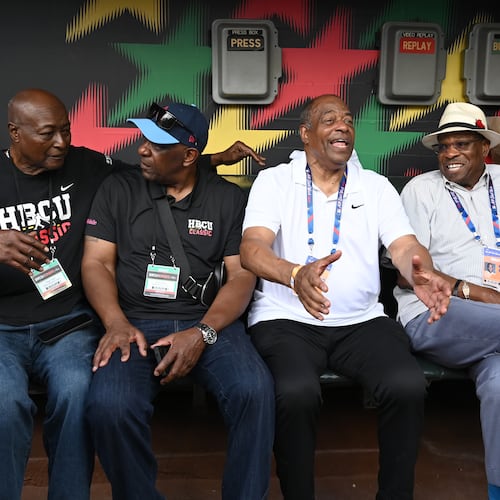Rotations win divisions. This we know from having watched the Braves at the end of the last century and the beginning of this. (Also from having seen the Philadelphia Phillies of more recent vintage.) Rotations eat innings. The more innings a rotation eats, the more a team wins. The more a team wins … you get the picture.
The Braves, who were supposed to run second to Washington, lead the National League East after a month and two days. The Nationals haven’t hit much yet, but neither have the Braves, apart from the more-than-occasional home run. The Braves ranked 11th in the league in batting average and ninth in runs scored entering Thursday’s game; the Nationals ranked 14th and 12th. (Washington also had made the most errors of any team in the majors, which never helps.)
The Braves have stolen a march on the massive favorite by matching the Nationals in starting pitching and bettering them in the bullpen. We could have guessed the latter part: The Braves’ relievers remain the best in the business. The part about the rotation, while not a shock, is nonetheless a bit of a surprise.
Over the winter, Buster Olney of ESPN Insider rated the top 10 rotations in baseball. Detroit was No. 1, Washington No. 2 and Philadelphia No. 4. The Braves were eighth overall, fifth-best in the National League and third-best in the five-team East. Truth to tell, No. 8 sounded about right. The Braves' No. 1 starter is Hudson, who would be No. 3 at best — behind Stephen Strasburg and Gio Gonzalez — on the Nationals.
But look here. Strasburg has started twice against the Braves this season and is 0-1; Gonzalez has worked nine innings against Atlanta and yielded 12 earned runs, losing to Paul Maholm on April 14 and to Hudson on Tuesday.
Small sample sizes? Absolutely. But Strasburg and Gonzalez going 0-for-the-Braves in 2013 were the key reason the Nationals started 0-5 against Atlanta, which was the key reason Washington finished April trailing by 4 1/2 games. The great rotation hadn’t quite held up its end, at least not yet.
The Braves’ team ERA got fluffed up by the last road trip — those Tigers hitters can do that — but most nights this rotation had gotten the game to the impregnable bullpen with a chance to win. Which is why the Braves were 17-9 on May 1. But with five more months to negotiate, can a rotation built more on finesse match the Nationals, who tend to throw harder, start for start for start?
Said Hudson, who Tuesday won his 200th game: “We have the potential to beat anybody out there. We’ve got guys who know how to pitch. Maybe there are guys out there with better pure stuff, but that doesn’t gauge what you have between the ears.”
Speaking of the rotation he assembled, general manager Frank Wren was so moved he coined a word. “Our guys are more dependent on ‘pitchability,’” he said, and he clarified by saying that’s one word, not two. “Our guys don’t have pure stuff; they’ve got good stuff. They just have outstanding pitchability.”
We pause here to note that the Braves employed two rather successful pitchers who shorted out no radar guns. One’s name was Glavine; the other’s was Maddux. They’ll soon reside, at least figuratively, in Cooperstown. So there’s that.
But baseball people do love their radar, and in an era where hitters are whiffing at dizzying rates it never hurts to have pitchers who make them whiff more. This rotation has the eighth-best ERA in the majors, but ranks only 19th in strikeouts. Might want to file that little numerical nugget.
Might also want to note how this series ended. Jordan Zimmermann, nominally the Nationals’ No. 3 starter but their best pitcher this season, beat Maholm, one of the three Braves whom Wren regards as a No. 2 starter, on Wednesday. (No, losing 2-0 is no blight on the pitcher. Still a loss, though.)
On Thursday, Dan Haren — imported for $13 million to be Washington’s No. 5 starter and the owner of a 6.29 ERA, beat Kris Medlen, who was unbeatable not so long ago. Medlen didn’t pitch poorly, either. He yielded three earned runs over seven innings, and Denard Span’s two-run double was first ruled an error on third baseman Chris Johnson.
Haren worked eight innings and was even better: One run, four hits, one walk. The Nationals won 3-1 to split the four games and serve notice that the Braves’ early domination has been, at least for the moment, halted. And we have five more months to watch and see if pitchability can indeed trump pitching ability.
About the Author
Keep Reading
The Latest
Featured



